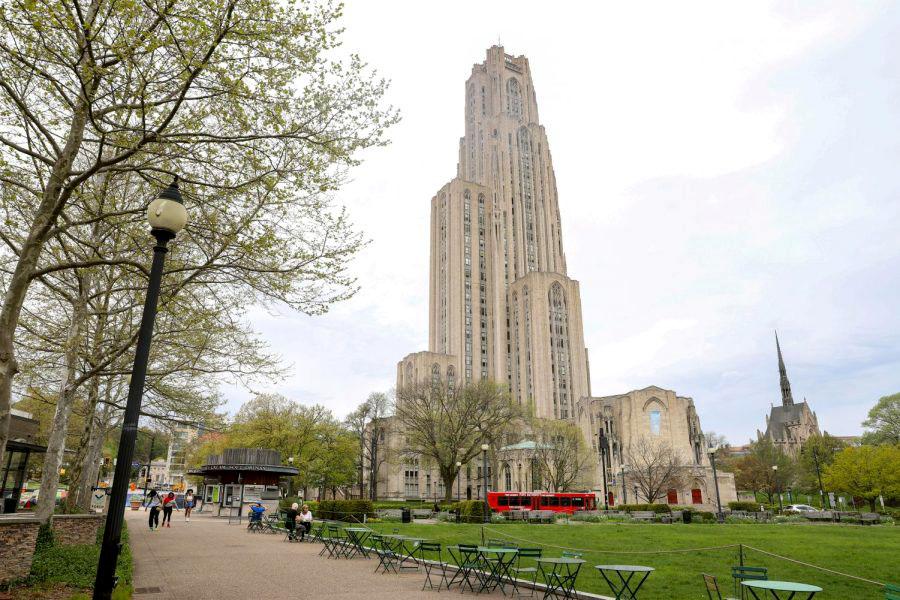‘Disappointing’: Pitt releases inaugural ESG report after several months’ delay
Kaycee Orwig | Senior Staff Photographer
The Cathedral of Learning seen from Schenley Plaza.
April 21, 2022
After reading the inaugural Environmental, Social and Governance Report, Fossil Free Pitt Coalition member Meredith Felde said it was “disappointing”. She said while Chief Financial Officer Hari Sastry has opened a discussion with student organizations such as FFPC, the Student Office of Sustainability and the Student Government Board, the report remains “vague.”
“We were pretty disappointed by the fact that they couldn’t produce that many metrics for measuring socially responsible investing, and they were pretty vague about everything,” Felde, a sophomore sociology major, said.
Pitt released the ESG report for its $5.6 billion endowment to provide “greater clarity” on how ESG factors are applied to decisions on investments. Pitt delayed the release from December until March. The Consolidated Endowment Fund is governed by the Investment Committee of the Board of Trustees and managed by the Office of Finance.
The FFPC and other student organizations, such as the Green Fund, have pressured the University to divest from the fossil fuel industry. The Ad-Hoc Committee on Fossil Fuels reported in January that private holdings in fossil fuels will decrease to zero by the end of 2035. According to the ESG report, the financial office has not made any new fossil fuel investments since February 2021.
Felde said FFPC believes the case studies cited in the report, such as denying investment in a metallurgical coal mine and denying investment in a Latin American private equity fund, were too short.
“My overall opinion, which reflects the opinion of the students from these environmental organizations who’ve been in contact with the CFO, is that it was pretty puny,” Felde said. “Mostly, we’re finding that the case studies in a typical ESG report would be an entire page or two each, and they would have very specific details. These were like … some of them [in the report] were three sentences.”
Felde specifically cited page seven of the report, which said the Committee “may consider” the social impact investments may have.
“In evaluating any specific social responsibility concern as directed by the Board, the Committee may consider the gravity of the social impact, the University’s need to maintain a sound financial investment policy, the potential effectiveness of the Committee’s investment or voting decisions to influence positive change, and such other considerations as the Committee may deem appropriate,” the report said.
The report said the financial office will not make investment recommendations based “solely” on their approval of company activities.
“In no event will a recommendation be made that an investment be selected or retained solely for the purpose of encouraging or expressing approval of a company’s activities or, alternatively, for the purpose of placing or leaving the University in a position to contest a company’s activities,” the report said.
Felde said this section of the report was “confusing” to her and other members of the Coalition.
“That part was particularly vexing to us, on account of the fact that it says you may consider the gravity of the social impact, you may consider the potential effectiveness of the investing, investment or voting decisions to influence positive change. But you can’t solely invest to encourage a company’s activities,” Felde said. “So the difference between the effectiveness of investment in influencing positive change and the effectiveness of investment encouraging approval of other companies’ activities is very confusing to us.”
Felde said she wants the financial office to continue speaking with students about the report and involve students in the process of writing it.
“One of the things that we’re looking for from the financial office is, first of all, more meetings like the ones that we’ve won that we just had with Hari Sastry, more student involvement in the ESG process in handling the endowment, student and faculty involvement in those kinds of decisions, better metrics,” Felde said.
University spokesperson David Seldin said the University has an “ongoing dialogue” with student groups, and will expand future reports to address these concerns.
“University officials reached out to a group of engaged students to discuss the report, and are continuing an ongoing dialogue about these issues. The inaugural ESG report is an initial step in providing greater clarity regarding how ESG factors are applied in the investment decision-making process of the Consolidated Endowment Fund,” Seldin said. “As common standards for ESG reporting are developed and quantitative metrics are agreed upon, we will look to broaden our reporting.”
Felde said she’d like to see Pitt make investments to help better the community, especially Black and brown communities that are affected by gentrification and redlining. She also said she wants to see Pitt invest in communities affected by environmental racism, as fossil fuel companies often build their factories in majority-Black neighborhoods.
“One of our biggest things we want to see is divesting from fossil fuels and putting that money into Pittsburgh-based communities. Specifically, communities affected by Pitt’s expansion, and especially Black and brown people in Pittsburgh who are suffering from gentrification and the impacts of redlining,” Felde said. “And also people who are being affected by environmental justice concerns.”
Felde said she’s “hopeful,” as Pitt is becoming more communicative with students about environmental issues. She said FFPC is hoping to raise awareness for the report in the future.
“Sastry was actually the one who initiated this dialogue. So we’re pretty hopeful going forward that we’re going to have more meetings,” Felde said. “We’re holding them accountable to actually follow through on that and schedule regular meetings with us and expand that kind of exposure of the ESG report and ESG policy to the public.”



